If you or someone you know has a baby who is allergic or intolerant to cow’s milk formula (or any other), then you’ve probably heard about this magical goat milk formula!
Goat’s milk has become extremely popular and, while it is not really magical (in the literal sense), it can be incredibly helpful when it comes to allergies, intolerance, and the like.
If we look back into the past, we’ll notice that goat milk has been a popular alternative for mommies who couldn’t give breast milk to their little ones (and still is even today).
Even though baby formulas based on cow’s milk are ten times more common, goat’s milk formula is a great alternative to cow milk formula and it can be very beneficial for little ones.

As always, every parent wants the best for their baby and toddler, and often they don’t have much time to check out every single product on the market or read every single article in order to learn about different infant milk formula recipes.
Luckily, you won’t need to do that because in this article you’ll learn everything you need to know about the benefits of goat milk formula, differences between cow milk formula and goat milk formula (including advantages and drawbacks of each) and what to look for in a goat’s milk formula.
But, first of all, here’s a review of the best goat milk formula for your baby (along with other ones) because, as always, babies deserve the best!
Kabrita Goat Milk Toddler Formula
- Made with high-quality Dutch goat milk that is naturally easy to digest
- Nutritionally fortified with 22 vitamins and minerals including vitamin D, DHA, and iron
- Great option for supplementing, weaning or as a gentle cow milk alternative
- May be an alternative for children experiencing minor issues associated with cow milk sensitivity
- Has a mild, sweet, fresh taste and smell
Prices pulled from the Amazon Product Advertising API on:
Product prices and availability are accurate as of the date/time indicated and are subject to change. Any price and availability information displayed on [relevant Amazon Site(s), as applicable] at the time of purchase will apply to the purchase of this product.
Kabrita goat milk formula is a richly nutritious toddler formula that doesn’t contain GMO ingredients, which is a huge plus! Kabrita is famous for maintaining high agricultural and manufacturing standards, so there’s no need to question the quality of this goat milk formula.
Unlike Holle mentioned below, Kabrita is not made of simple ingredients, but complex ones in order to be more similar to breast milk.
This goat milk formula contains 22 vitamins and minerals, as well as fatty acids (DHA and ARA) that are responsible for babies’ healthy nervous system, brain, and eyes.
Kabrita’s formula is based on lactose and contains some extra whey so that the whey/casein ratio resembles that of breast milk. As a result, this helps babies process the formula easier and faster.
Even though the research on whey, casein, and digestion has mostly been done on cow’s milk, it’s safe to say that extra whey in both cow’s milk and goat’s milk can be really helpful for babies.
Additionally, Kabrita contains non-GMO vegetable oils (soybean oil, palm kernel oil, sunflower oil, and others) for the purpose of resembling fats found in breast milk.
Unlike some other brands, Kabrita uses a type of palm oil that is devoid of all the negative traits of standard palm oil.
This special type of fat blend facilitates softer stools, which is particularly helpful for babies who are suffering from constipation.
Parents have reported that this formula suitable for ages 12-24 months both tastes and smells great, which is another plus!
All in all, it is a worthy alternative to breast milk, and you should definitely give it a try (if you haven’t yet already).
Other Top Goat Milk Formulas On The Market:
● Holle Organic Infant Goat Milk Formula
● Designed By Nature Goat Milk Formula
● Nanny Care First Infant Goat Milk Formula
● Sammy’s Milk Goat Milk Toddler Formula
Holle Organic Infant Goat Milk Formula
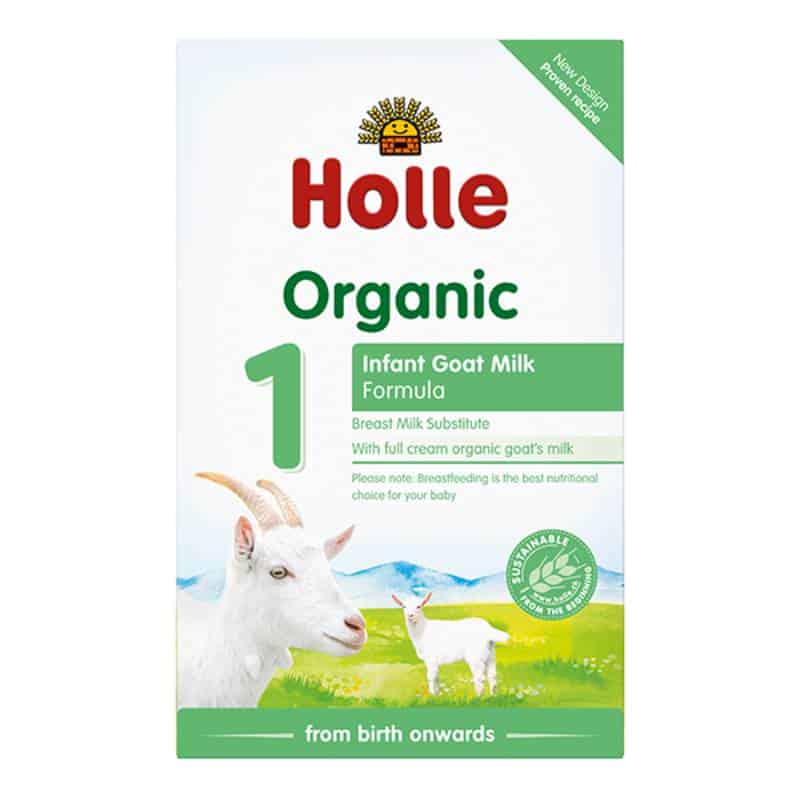
Image via huggable.com
On the contrary to other formulas, Holle Organic is the only organic goat milk formula out there. This is the number one reason (with tons of other reasons) why this goat milk formula is one of the best, so let’s see!
First of all, Holle is known to be one of the oldest infant formula brands in Europe and famous for its high standards regarding every aspect of production from animal welfare to high-quality baby formulas.
It’s also important to note that organic products in Europe have higher organic standards to that of the United States.
You don’t need to worry about this goat milk formula containing toxic nutrients, hormones, pesticides, or GMO ingredients, additives, and artificial flavors – Holle Goat is made of whole organic goat milk.
It contains less lactose than other goat milk formulas, which means your baby won’t feel bloated, have gas, or be prone to other digestive problems, as is often the case with its market counterparts (especially those that are based on cow’s milk).
It doesn’t contain corn syrup, sucrose, glucose syrup, gluten, or soy, which definitely adds to its well-respected reputation.
Another reason Holle goat milk formula deserves to be praised is it contains the types of casein proteins that are very similar to those found in breast milk (which is not the case with cow’s milk formula).
Also, it doesn’t contain lots of alpha-s1 casein protein, which is responsible for babies being sensitive to milk protein.
What I like most about this baby product is the mix of organic vegetable oils (organic palm oil, organic rapeseed oil, organic sunflower oil) along with all the essential vitamins and minerals (calcium carbonate, niacin, Vitamin D, Vitamin B6, Vitamin B12, Vitamin A, Vitamin C, Vitamin E, iron) that are extremely beneficial for babies’ development!
You can find this formula in three stages:
● Holle Goat Stage 1 (suitable for ages 0-6 months)
● Holle Goat Stage 2 (suitable for ages 6 months upwards)
● Holle Goat Stage 3 (suitable for ages 10 months upwards)
This is great because it means you don’t need to switch to other brands; you can simply continue with the same one you know is high-quality and can be trusted.
Given that Holle Goat contains all the essential nutrients for your baby, it can be consumed as a supplement to breast milk or on its own.
Designed By Nature Goat Milk Formula
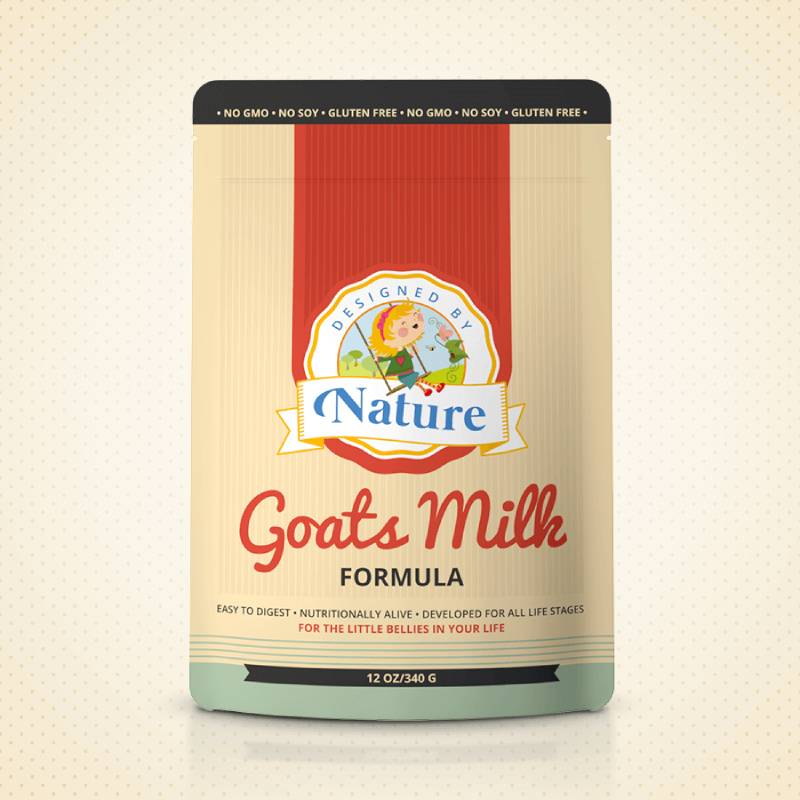
Image via Designed by nature.com
Designed by Nature goat milk formula is appropriate for babies of all ages! I find this “feature” really practical because you won’t have to shift between brands and other products as your baby grows (and Lord knows that babies grow too fast).
This formula can be given to little ones as complete nutrition, or to complement to breast milk and solid foods.
As the brand name implies, this goat milk formula is literally designed by nature because the main ingredient is whole goat milk powder.
Also, the majority of ingredients are organic, plus it doesn’t contain GMO ingredients, soy, corn, gluten, or any type of processed sweeteners like corn syrup.
The fat blend consists of organic olive oil, organic sunflower oil, and organic coconut oil.
I personally use coconut oil for my body, hair, and as a part of my diet, and all I can say is that this is one of the most beneficial oils out there because it’s highly rich in natural saturated fats (about 90%).
However, this formula doesn’t include prebiotics or probiotics, so you might consider adding it as a supplement to your baby’s diet regimen.
Nanny Care First Infant Goat Milk Formula
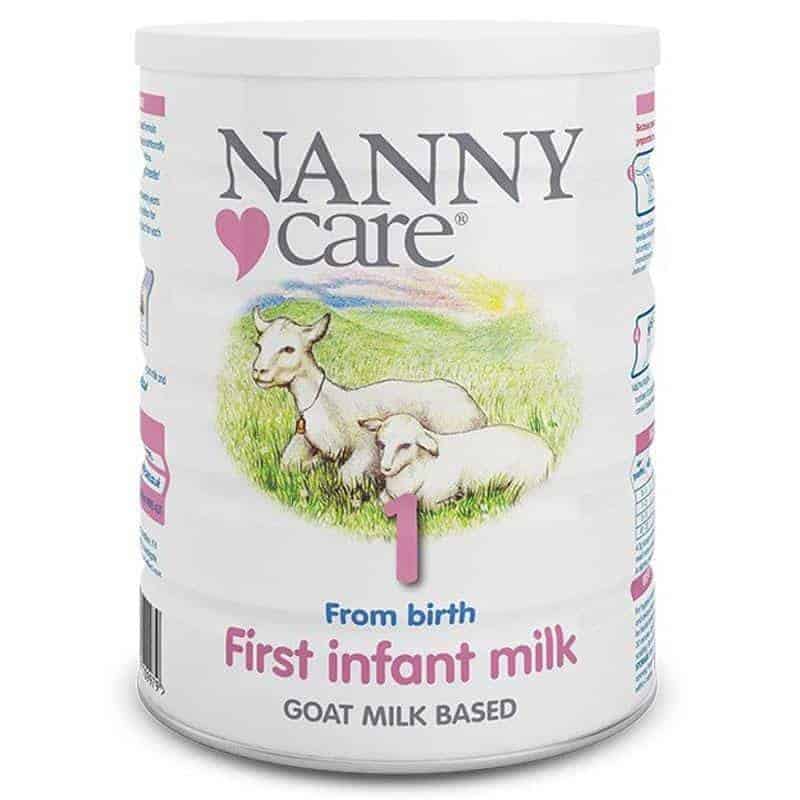
Image via Formuland.com
Nanny Care is another highly nutritious goat milk formula on the market. This formula is based on pasteurized whole goat milk and it is enriched with additional lactose.
It is free from any type of processed sweeteners. However, this formula doesn’t contain any extra whey protein.
It is super rich in vitamins (Vitamin A, Vitamin D3, Vitamin E, Vitamin K1, Vitamin C, Vitamin B1, B2, B3, Biotin, and many others) that are essential for babies’ brain development and boosting of cognitive function.
Vitamin C is our best friend when it comes to fighting diseases, whereas calcium contributes to stronger bones, and so on.
The fat blend is not complex (sunflower and rapeseed oils) and this formula doesn’t contain palm oil.
It also contains a wide array of minerals responsible for boosting the baby’s immune system and overall health.
Just like some of the above-mentioned goat milk products, this formula is not entirely organic and there are no prebiotics/probiotics and fatty acids (like DHA or ARA) added.
Because of that, it is wise to consider adding prebiotics/probiotics as a supplement to your baby’s diet in order to boost your baby’s immune, nervous, and digestive systems.
This goat milk brand comes in three different stages:
● The First Infant Milk Formula (suitable for ages 0-6 months)
● Follow On Goat Milk Formula (suitable for ages 6 months to 1 year)
● Growing Up Goat Milk Formula (suitable for ages 1-3 years)
The first two stages can be used on their own or you can use them as a complement to breast milk, whereas the last stage is labeled a “fortified goat milk drink.”
Sammy’s Milk Goat Milk Toddler Formula
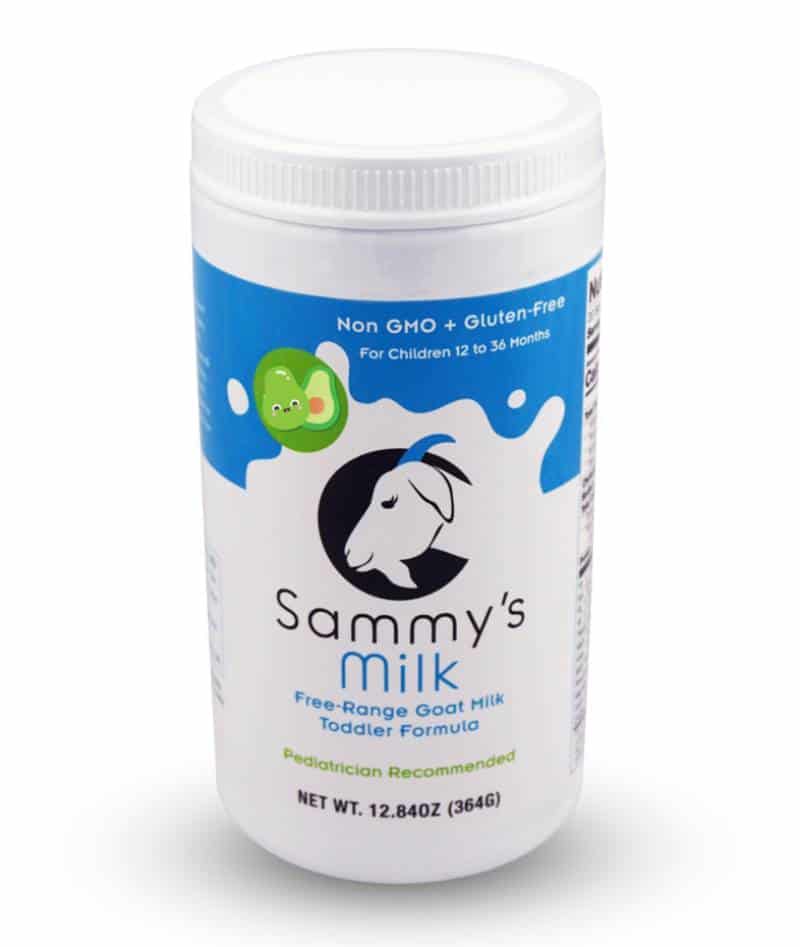
Image via Sammysmilk.com
Believe it or not, this high-quality goat milk formula contains only six ingredients. It is also enriched with 23 vitamins and minerals.
This is another great option for toddlers who have difficulty processing cow’s milk products and you can also use it as a supplement to breast milk.
This is not an organic formula, but the great news is that it is free from GMO ingredients and any artificial additives. It is based on whole goat milk and it doesn’t have any pesticides, hormones, or chemicals added.
What is special about Sammy’s Milk is that it contains avocado oil instead of standard vegetable oils like palm oil, soy oil, rapeseed oil, or sunflower oil.
I think there’s no need to explain how beneficial avocado oil truly is, but still, I’ll use this opportunity to highlight its benefits.
Avocado oil is rich in heart-healthy oleic acid, a monounsaturated omega-9 fatty acid, lutein, various vitamins and minerals like Vitamin K, Folate, Vitamin C, Potassium, Vitamin B5, Vitamin B6, Vitamin E, copper, iron, zinc, phosphorus and vitamins A, B1 (thiamine), and B3 (niacin) and many others.
It is one of the most powerful antioxidants in the world known to improve eye and skin health, and help heal wounds faster.
Also, it’s good to know that our body doesn’t have the ability to produce lutein naturally, which means we need to obtain it from our diet (like avocado).
Another special feature of this goat milk formula is non-GMO molasses – a great carbohydrate source that balances milk protein.
Sammy’s Milk also contains omega-3 fatty acids from fish oil and prebiotics (fructo-oligosaccharides and galacto-oligosaccharides), which are responsible for improving gut flora.
Regarding the fish oil, you don’t need to worry that it contains harmful, toxic elements like heavy metals or mercury – Sammy’s Milk reassures that it doesn’t and their oil is harvested from wild fish.
10 Benefits Of Goat Milk Formula For Your Little One
1. Less allergenic

When milk comes into contact with babies’ stomach acid, it develops curds as a result. The difference is that some formulas tend to create hard curds, whereas others create soft curds.
This influences how milk “travels” through the baby’s tummy. Does your baby have a tendency to spit up a lot after eating or in between feeding sessions?
If yes, then goat milk formula is probably a far better alternative for your little one. Unlike cow milk, goat milk is free from a type of casein protein (or it can be found in traces).
This type of protein in cow milk can cause serious issues like reflux and similar.Now, I’m not stating that goat milk is allergen-free, but it is less allergenic than cow milk.
Beta-lactoglobulin is found in both goat’s milk and cow’s milk and this might be the reason why some babies are allergic to both types of milk.
If your baby is one of them, then you know what’s to blame!
2. More digestible
Cow’s milk has longer fatty acids, whereas goat’s milk has shorter and medium fatty acids.
Longer fatty acids cause difficulties when it comes to digesting because they need more “work” and time to be digested, whereas shorter (medium) fatty acids are digested easier.
Now you’re probably thinking about whether this goat milk formula contains less fat than other formulas on the market. And the answer is no.
Shorter and medium fatty acids are not made of less fat, but they are only a different type of fat that helps babies digest faster and with less effort.
3. Boosts immune system

Boosting a baby’s immune system should always be a priority to every parent. A good immunity protects children from potential illnesses.
Goat milk formula boosts babies’ immune system with a mineral called selenium.
It’s important to note that this mineral doesn’t provide complete protection from illnesses, but rather helps boost your child’s immunity.
When it comes to that, any amount of immune boosters matters equally.
4. Less lactose
Lactose is both present in goat milk formula and other formulas, but the major difference is that goat milk formula contains less lactose.
The main reason why babies sometimes feel bloated, or have gas and similar digestive problems when consuming cow’s milk, is because of lactose.
On the contrary to goat’s milk, cow’s milk contains more lactose and that’s why it tends to cause all those issues.
However, every baby is unique, so just because goat milk formula contains less lactose, this doesn’t mean your child will have a good reaction to it (even though chances are high that she will).
You know what they say: If you don’t try, you’ll never know.
So, giving a lactose intolerant baby goat milk formula is definitely something you should consider to see how her sensitive stomach will accept it.
5. Essential nutrients

Goat milk formula abounds in various essential nutrients that are responsible for baby’s growth and development.
Do you know how much calcium goat’s milk contains? Believe it or not, it contains 35% RDA in one cup!
Among others, it also contains the following essential nutrients:
● Vitamin B12
● Protein
● Riboflavin (20% RDA in a cup)
● Potassium
● Phosphorous
These nutrients are extremely beneficial for babies’ health, since they boost babies’ strength, help with the nervous system, and so much more.
6. Less toxic
One of the things that I’m really concerned about is any type of artificial elements in baby food.
Since they are sensitive little creatures, filling them up with toxic things is a real crime.
But, not many parents are aware of that (and who could blame them) because there are so many things they need to think about, so they often forget to pay attention to every single detail.
But, this one detail is really important! The thing is, cow’s milk contains growth hormones for which its main purpose is to artificially increase the amount of milk they produce on a daily basis.
These growth hormones may affect babies’ health by causing various digestive problems.
Luckily, unlike cow milk, they are seldom given to goats, which makes goat’s milk less toxic for the baby’s stomach and digestion overall.
Goat’s milk is not genetically modified as with cow’s milk, meaning that goat’s milk offers pure nutrients because it doesn’t contain any artificial or toxic elements.
7. High in calcium

When we think of cow’s milk, the first thing that comes into our mind is calcium, right?
It is a universally acknowledged truth that cow’s milk abounds in calcium, but it is also true that goat’s milk contains lots of calcium as well!
So, there’s no need to deal with cow’s milk growth hormones and other toxic elements just because of calcium when you can find it in goat’s milk, too.
The amino acid tryptophan is responsible for the level of calcium in goat’s milk, and it’s this amino acid that helps to foster healthy sleep and build stronger bones.
If your baby is having difficulties sleeping, goat’s milk will encourage good sleeping patterns (can you say naptime!), in turn giving you more time to deal with other things.
Your baby will be healthy, well-rested, and happy, which is the ultimate goal of every parent, right? Right.
8. Doesn’t cause inflammation
Many babies suffer from bowel inflammation due to consuming cow’s milk. If your baby has inflamed bowels, then goat milk formula is definitely a good option to go for.
As already mentioned, goat milk formula offers plenty of beneficial nutrients and it helps babies with digestion.
Goat’s milk is digested easier and doesn’t contain anything toxic or harmful that might cause inflammation.
9. Metabolism

Some babies have difficulty absorbing all the essential vitamins and minerals due to digestive problems, and that is where goat’s milk comes in handy!
Goat milk formula has the power of improving and boosting babies’ metabolism.
It helps babies process minerals like iron and copper. Now, I know what you think: But there are plenty of vitamins and minerals that I can give my baby as supplements.
And, yes, there are plenty of essential vitamins and minerals in a supplement form, but is that a healthier option than goat’s milk?
The answer is: No. Why? Because the majority of these supplements available on the market are artificial, meaning they are made of synthetic nutrients.
On the other hand, natural nutrients are obtained from whole food sources only (just like goat’s milk). So, goat’s milk is a natural, healthier way of providing your baby with essential nutrients.
In case you need more convincing, here’s my humble opinion.
I always say the following: Don’t go chasing artificial things if you have the ability to enjoy natural ones.
When it comes to diet, many of us think organic food is ten times more expensive than junk food or GMO food.
But, when you think about the amount of money you’ll be spending once you get sick from all that junk food, then organic food doesn’t seem that expensive after all, right?
10. Environmentally friendly
Whenever I’m looking for a certain product, I always make sure to check if it is environmentally friendly.
I don’t want to buy something that is harmful to the environment, affects animals in one way or another, or has been tested on poor creatures because it’s cruel and inhumane.
We often forget that animals are not our servants or mere products that can be treated the way we want. With that in mind, raising goats is a more eco-friendly solution than raising cows.
In comparison to cows, goats are less needy, meaning they don’t require as much space and food as cows do, and are therefore generally cared for in a more environmentally friendly way.
If we want to live happily, we need to support our environment too, because if we don’t, no one else will.
Goat Milk Formula vs. Cow Milk Formula
In case you’re wondering about whether goat milk formula is healthier and more beneficial than cow’s milk, the answer is not that simple.
This depends on a variety of factors (including the fact that every baby is unique!)
The best cow’s milk and goat’s milk formulas are those that are very similar to human milk, which means they have to contain the following things in order to be considered a quality alternative for breast milk:
● Carbohydrates
● Protein
● Fats
● Vitamins and minerals
● Extra nutritious ingredients like DHA, ARA, prebiotics, and probiotics (in individual cases).

As already stated, goat milk protein tends to shape smaller, looser curd in the gut than those found in cow milk.
These milk protein curds are easier for babies to digest because they are degraded faster.
There’s a lower chance of these smaller proteins irritating babies’ digestive systems that will prevent them from experiencing all those exhausting symptoms like gas, constipation, and similar.
Goat milk is richer in some vitamins and minerals than cow milk, whereas cow’s milk is richer in folic acid and B12 than goat milk.
That said, all formulas are designed to include an adequate balance of both vitamins and minerals to be a good alternative to breast milk.
On the contrary to cow milk, goat milk formulas abound in various types of natural prebiotic oligosaccharides.
Some of these prebiotic oligosaccharides can be found in breast milk, which means that goat milk is a worthy breast milk alternative because it encourages the growth of gut flora like bifidobacteria, and protects little ones against various infections (for instance, E. coli).
We’re all familiar with breast milk’s anti-infection purposes and now it seems that the oligosaccharides in goat milk can achieve the same effect of boosting babies’ immune system.
While goat milk tends to be less troublesome for babies sensitive to cow’s milk proteins, it’s important to mention that babies who have a diagnosed dairy allergy (cow milk protein allergy) could experience an allergic reaction with goat’s milk as well. Why?
Because if you have a milk protein allergy, even a trace of milk protein can initiate an allergic reaction.
The most common symptoms of an allergic reaction are digestive problems, hay fever symptoms, and even skin rashes.

Babies with cow milk protein allergy have equal chances of being intolerant to goat or soy milk formula as well.
It is important that every parent consults with their pediatrician when it comes to choosing the right baby formula (especially in cases where the baby has a diagnosed milk protein allergy).
If that is the case with your little one, then a hypoallergenic formula based on extensively hydrolyzed proteins is your best bet!
The bottom line is that goat milk formula is a worthy substitute for babies who have difficulties processing cow’s milk formula and are not diagnosed with milk protein allergy.
You might also want to know more about:
Cow’s Milk Allergy In Infants
Cow’s milk allergy (CMA) is one of the most typical allergies that affect little children.
This allergy usually develops days to weeks after the first time you introduce your baby to cow’s milk (in goat milk formula or other solid food later on).
Believe it or not, CMA can also affect infants through breastfeeding. This happens when a mother consumes cow’s milk as a part of her diet and then it passes to the baby through breast milk.
However, it’s important to note that this is a rare occurrence (so no need to worry).
What’s going on in a baby’s stomach when they have cow’s milk allergy?
When babies have cows’ milk allergy, it basically means that their immune system tends to overreact to proteins in cow’s milk.
Their body sees these proteins as the enemy and starts working hard to fight/exterminate them.
This process causes an allergic reaction and when that happens, babies’ bodies start releasing certain chemicals like histamine.
Cow’s milk is in the majority of toddler formulas, but the truth is that anyone of us can develop milk allergy (it’s just that little children are more susceptible to it).
Also, many children build a tolerance to this allergen over time.
There are two main categories of CMA:
● Immediate CMA
● Delayed CMA
Immediate CMA means that the allergy symptoms start developing within minutes after consuming cow’s milk, whereas delayed CMA denotes symptoms that start developing a few hours or days after consuming cow’s milk.

Most Common Signs And Symptoms Of CMA
● Digestive issues (stomach ache, colic, diarrhoea, vomiting and similar)
● Swelling of the lips, face and area around the eyes (including itchy, watery eyes)
● Red itchy skin rash
● Difficult noisy breathing
● Coughing (runny or blocked nose)
● Throat tightness (dry, harsh voice)
● Wheezing
● Hives
● Low blood pressure causing dizziness or blackout
● Eczema
When it comes to experiencing cows’ milk allergy, every allergic reaction is unique.
This means that your baby could have a mild reaction the first time, and then the next time or any other their reaction could be more severe than the last one.
Apart from CMA, infants can also be lactose or milk intolerant.
An intolerance to milk causes diarrhea, babies rejecting food, blood in the stool, restlessness, among others. Lactose intolerance basically means the baby’s body having difficulties processing milk.
Note: If you’re not really sure whether your baby suffers from intolerance or an allergy, make sure to consult with your doctor.
What To Look For In A Goat’s Milk Formula
We all know that there’s no perfect formula in the world for anything, and the same rule applies to goat milk formula as well.
Paying attention to certain factors and ingredients will help you choose the most suitable formula for your baby!
First of all, it’s extremely important to choose a quality product.
Given that cow’s milk formulas dominate the market, goat milk formulas are harder to find.
But, there are some great goat milk formulas that you will find on the list below (so stay tuned)!
When it comes to choosing the best goat milk formula for your baby, it’s important to pay attention to several factors that will help you find the right formula for your one-of-a-kind little one!
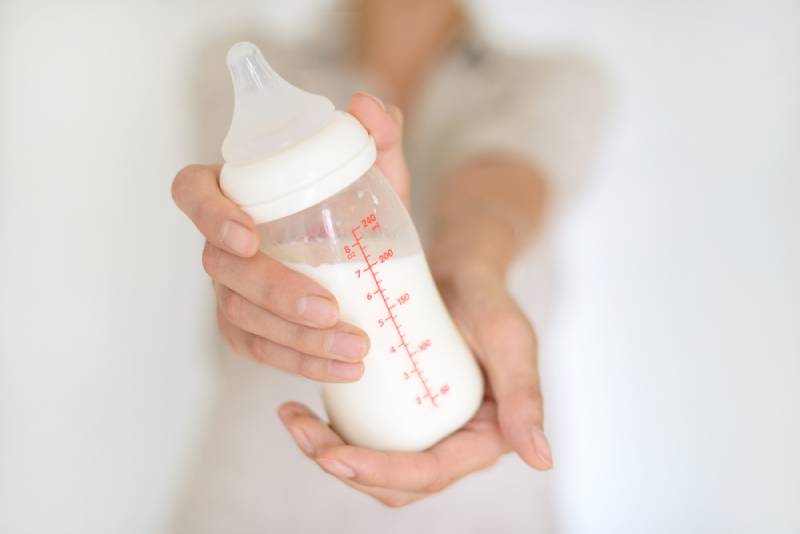
Some of these factors are:
1. Organic standards, or at least non-GMO standards
It is strongly recommended to choose a goat milk formula that doesn’t contain GMO ingredients because they can be harmful for a baby and influence their growth.
Organic formula is ideal, but non-GMO formula is another decent alternative.
GMO ingredients can be really harmful for adults as well, let alone little babies whose digestive system is super sensitive. So, keep this in mind!
2. A formula with whey/casein ratio similar to breast milk
There’s nothing more painful than watching a little baby with gas, constipation, and other health issues that cause terrible discomfort.
A whey/casein ratio that resembles breast milk helps avoid the above-mentioned digestive issues.
Breast milk naturally contains more whey than casein, whereas goat milk contains more casein. Because of that, it is important to add some goat whey protein to formula in order to be more similar to breast milk.
3. Addition of lactose (for the purpose of simulating breast milk)
Since goat’s milk doesn’t contain the same amount of lactose as breast milk, goat’s milk formula needs to have added carbohydrates to balance babies’ needs.
4. NO ADDED:
● Synthetic preservatives and nutrients (taurine, L-Carnitine, etc.)
● Hexane-extracted DHA/ARA
● Sugars, types of oils, fats
● Maltodextrin or syrup solids.

In some goat milk formulas, you can also find prebiotics/probiotics which is essential for easier digestion and improving babies’ immune protection.
But, these are not necessary ingredients, but rather extras because, as we already mentioned, goat milk already contains lots of oligosaccharides.
Some of the most popular formulas are those that contain fatty acids (e.g. DHA and ARA) because they are responsible for the baby’s healthy development.
Again, pay attention that DHA is not hexane-extracted (as listed above).
Final Thoughts
Goat milk formula has plenty of benefits as stated above, and therefore, it is a great choice for your little one (especially if your baby is suffering from digestive issues or intolerant to cow’s milk).
It is a legit replacement for cow’s milk formula because it contains all the essential nutrients that promote baby’s healthy physical and mental development.
Many parents tend to stick to the same milk formula they used from day one out of fear that their baby wouldn’t accept other milk formulas.
But, regarding goat milk formula, there’s nothing to worry about. The goat milk formulas listed above are made of richly nutritious, high-grade ingredients. I’ll repeat again: If you don’t try, you’ll never know.
These goat milk formulas might be exactly what your baby needs in order to minimize or prevent any aftereffects of a milk protein sensitivity.
Besides that, they all taste and smell good, which means the ultimate pleasure for your baby is guaranteed!
Like this post? Please share or pin it for later. You can also stay in the loop and follow us on Facebook, Instagram or Pinterest.
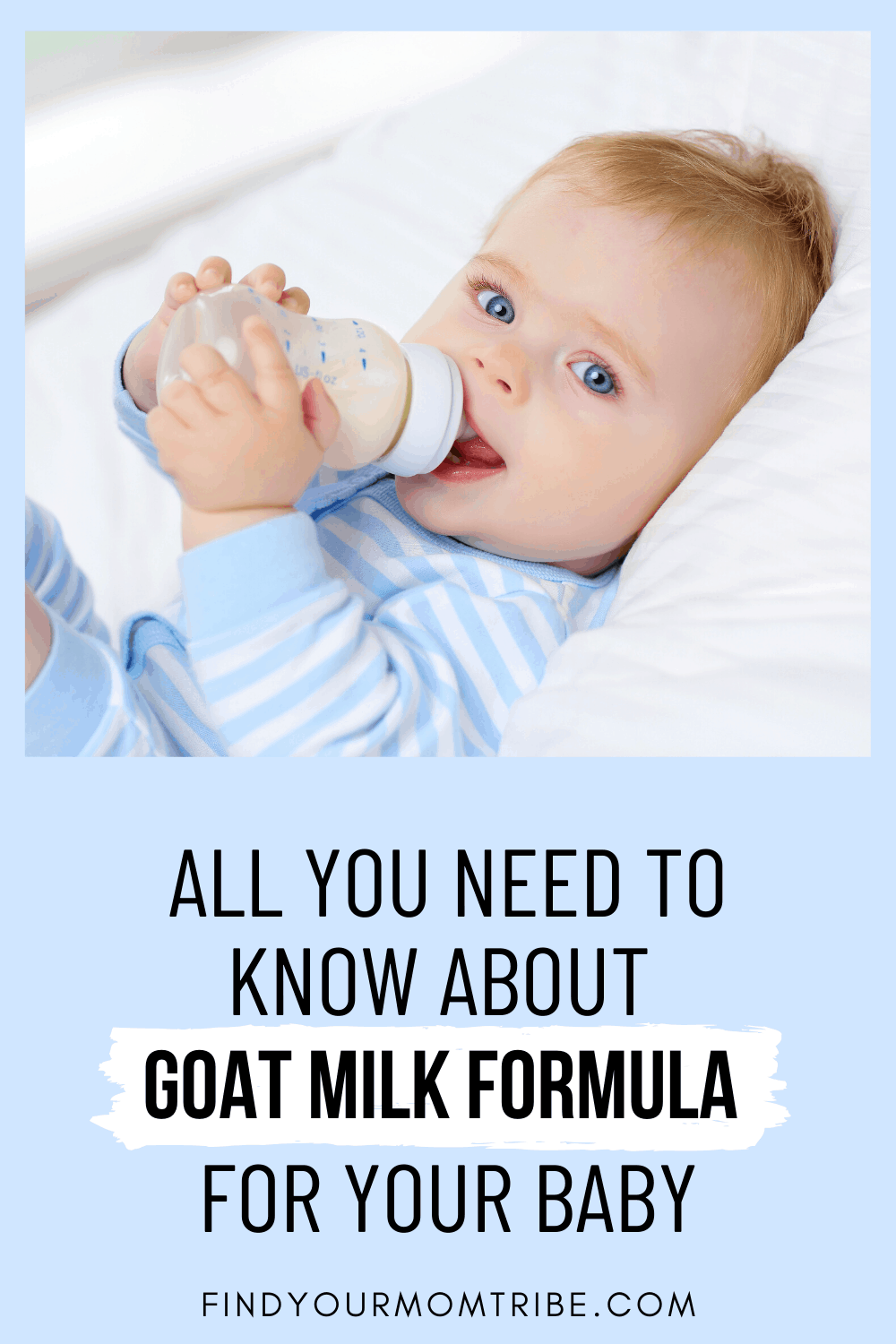
We love honesty! Find Your Mom Tribe is an Amazon Associate and we earn from qualifying purchases through affiliate links at no extra cost to you. Please see our full Amazon Affiliate disclosure for more information.

